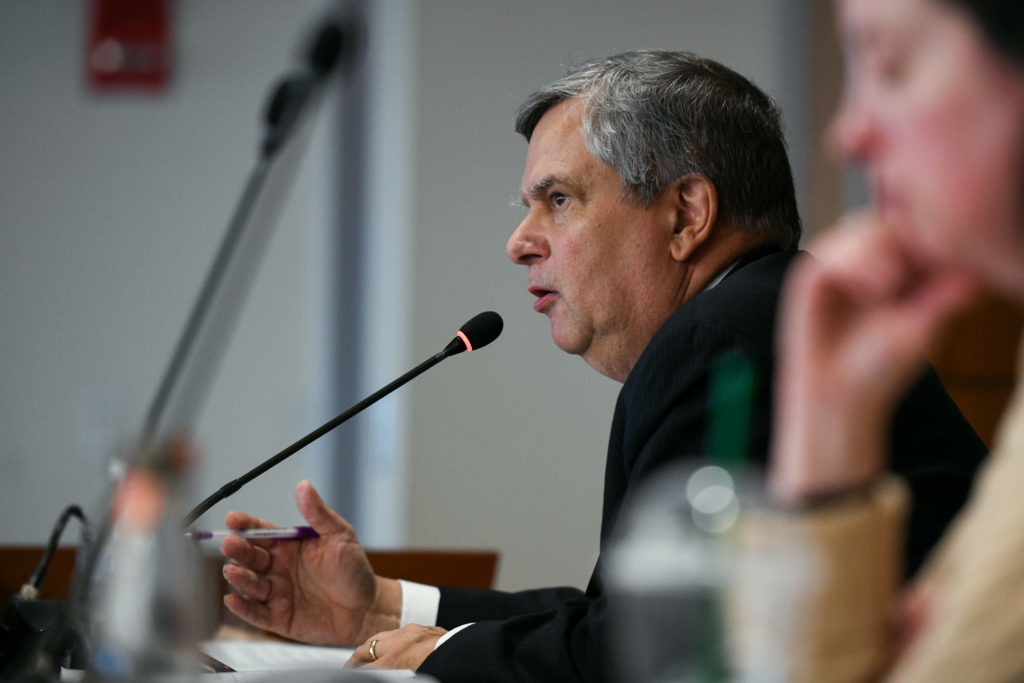Updated: March 5, 2018 at 11:50 p.m.
The Faculty Senate passed a resolution Friday calling on the University to require that online courses undergo an identical review process as face-to-face classes within their schools.
The resolution was passed following 90 minutes of debate and months of discussion about the quality of GW’s online programs, which faculty and officials agreed was strong despite a fall report that raised questions about oversight of courses taught online. Professors said the resolution will give faculty an outline of how to teach online classes and follow uniform procedures.
The resolution was approved by a vote of 22-8 on a secret ballot. In a prolonged debate on the merits of the resolution, some faculty said they opposed the proposal because it was unclear what message faculty were sending about the quality of online courses, while others said the resolution only amounted to a stamp of approval for online programs that was unneeded.
Traditional programs are required to undergo review at least every three years, but schools have the ability to set their own standards for evaluations. Online programs are supposed to be reviewed every three years, but some professors said many programs are reviewed more often.
“Students who want to consider coming and taking an online course will know they are getting the same high quality education that they are in the face-to-face modality.”
Philip Wirtz, professor of decision sciences and psychology and the chair of educational policy committee, said he consulted with faculty to craft the language of the resolution to help guide online courses to the highest quality possible after a faculty task force criticized the oversight of online programs last fall.
Following that report, Wirtz said his committee would consider proposals to address the issues raised in the report.
“Students who want to consider coming and taking an online course will know they are getting the same high quality education that they are in the face-to-face modality,” he said.
The resolution also calls for feedback surveys to be distributed following every online course, commits the educational policy committee to examine class sizes for online courses and asks the provost to present annual updates on online and distance learning.
Provost Forrest Maltzman defended online programs in a presentation to the Faculty Senate last month, reacting to the initial report. He argued that data consistently shows that quality and student satisfaction are equal in online courses compared to face-to-face classes, but still called for increased monitoring of those programs.
The resolution endorses Maltzman’s recommendations to use a survey evaluation system that includes online-specific questions and requires faculty who teach courses online to retain lecture materials to ensure their teaching can be reviewed.
The resolution recognizes administrators and faculty overseeing several online programs “which ascribe to, set and implement online standards of the highest quality.”
Ryan Watkins, an associate professor of educational leadership, proposed and withdrew an amendment to the resolution. He said he has taught online courses for 20 years and wasn’t convinced there were systemic problems in the online programs at the University.
“As a scientist, I have to look at the data,” he said at the meeting. “The resolution may be trying to fix something, we don’t know what that is.”
Robert Zeman, a professor of radiology, then proposed and successfully carried an amendment to the resolution stating that online programs be reviewed the same as traditional programs. The original resolution proposed regularly reviewing online courses but did not stipulate that their review would be identical to the review of face-to-face classes.
“This is a new modality for all of us. Let’s make sure we’re doing it the right way.”
The resolution was abruptly changed in the days leading up to the meeting by members of the educational policy committee. They redrafted the language after some faculty said it was insulting to online instructors, which Wirtz said was unintentional.
The resolution initially called for all hybrid and online programs to be “reviewed by the regular faculty” at least every three years or when there was a change in mode of delivery or curriculum.
Online professors also felt maligned by the initial report released in the fall, which they said raised unfounded concerns about quality.
Eric Cline, a professor of classics and anthropology, said most professors who had never led an online course wanted to put forward a resolution like this to have guidelines to follow as these courses are designed.
In 2016, the University launched a course for faculty who were creating their own online courses.
“This is a new modality for all of us,” he said. “Let’s make sure we’re doing it the right way.”
This post was updated to reflect the following correction:
The Hatchet incorrectly reported that Watkins successfully carried an amendment to the resolution that online programs be reviewed at least every three years. He proposed an amendment but it did not go to a vote. We regret this error.





